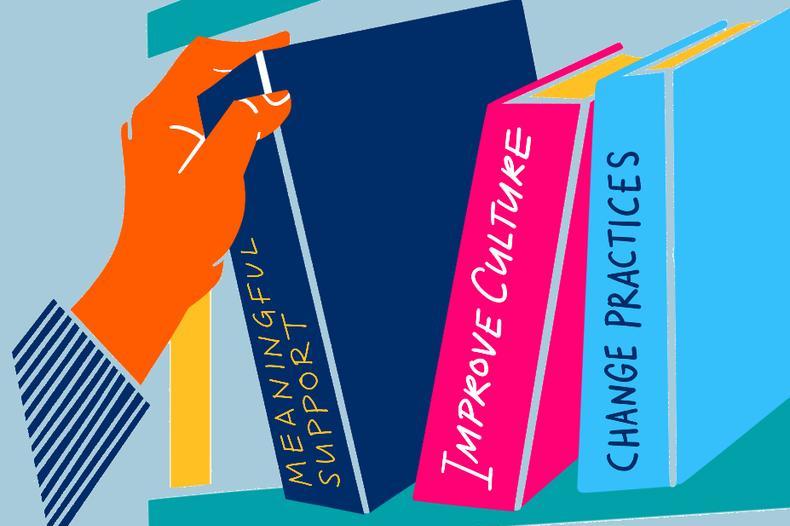Life in the Law 2025: It’s time to rethink how we work
Mental health charity, LawCare recently published its Life in the Law 2025 report, calling for the profession to step up and take action on wellbeing.

The new Life in the Law 2025 report looks at what needs to change so that working in law isn’t just about getting through the day, but also about building a sustainable sector that lasts.
Built to last?

The legal sector has long prided itself on endurance, with long hours, high standards and resilience regarded as prerequisites. But Life in the Law 2025 asks a harder question: what if endurance isn’t enough? What if the real challenge is creating a sustainable profession where people can do their best work, keep well and choose to stay for the long term?
As Life in the Law 2025 warns, “The legal sector is at a turning point… unless decisive action is taken now, the profession risks losing people, further erosion of mental health and wellbeing and reduced public trust and confidence.”
This research draws on insights not only from individuals working in law, but also from organisations such as firms, chambers, in-house teams and professional bodies that shape the culture people work in. Hearing both sides matters because creating a healthy, sustainable profession requires shared responsibility and strong leadership.
“The legal sector helps to uphold the rights and responsibilities that shape our communities. Its long-term sustainability relies not only on attracting and retaining people, but on fostering a culture where people can grow, contribute fully and choose to stay.” Life in the Law 2025, LawCare
Law depends on skilled, committed people. But when workloads, culture and expectations make it hard to cope, the whole system begins to suffer — from wellbeing and ethics to client care and retention.
Life in the Law 2025 shifts the focus from asking individuals to “be more resilient” to looking at what needs to change across the sector. There are five evidence-based recommendations from Life in the Law 2025 for building that future, from managing workloads and valuing good leadership to preparing the next generation for life in the law.
Five recommendations for a sustainable profession

1. Actively manage workloads
“High levels of work intensity can lead to poor work-life balance, increased stress and poor levels of mental health and wellbeing.” Life in the Law 2025, LawCare
One solicitor in England and Wales put it simply: “There is always more work to do and never enough time to do it.”
When people regularly work beyond their contracted hours, it’s not just tiring — it’s unsustainable. Workplaces need to look at the causes of heavy workloads, ensure targets are realistic, review staffing levels and challenge the “always on” culture.
Leaders have a key role here: sustainable careers start with fair, balanced workloads and a clear message that wellbeing matters as much as productivity.
2. Prioritise and value managing people
Supportive management is one of the strongest predictors of good mental health, yet managing people is often undervalued and under-resourced in the legal sector.
One lawyer shared their experience: “My manager wants to support us but doesn’t have the time or training to do it properly.” (Solicitor, England and Wales)
Leadership at every level sets the tone for how people experience their work. Good management is about more than supervision, it’s about having the skills, time and confidence to support people well. When managers are stretched too thin or haven’t had proper training, it affects the whole team.
Organisations are encouraged to make managing people a recognised professional skill, offering proper training, time and reward. Strong, compassionate leadership helps build teams that are both effective and sustainable.
3. Embed hybrid and flexible working options
“Offering hybrid and flexible working arrangements is beneficial in terms of both mental health and wellbeing and equality, diversity and inclusion. To work well they must be designed with care … and shaped through open dialogue and collaboration.” Life in the Law 2025, LawCare
Flexible and hybrid working can make legal careers more sustainable, especially for people with caring responsibilities or those looking for a better work-life balance. But it only works if it’s planned carefully. Without clear boundaries and regular connection, flexibility can lead to people feeling alone or pressured to always be available.
One participant shared, “Working from home gives me flexibility, but it also makes it harder to switch off. The boundaries between work and home have disappeared.” (Solicitor, England and Wales)
Organisations that co-design flexible arrangements with their people, and ensure leaders model healthy boundaries, are more likely to build workplaces where flexibility really works for everyone.
4. Evaluate programmes and activities that support mental health and wellbeing
“To understand what works and why, it is vital to evaluate existing mental health and wellbeing programmes and activities.” Life in the Law 2025, LawCare
As one solicitor commented, “My firm talks a lot about wellbeing, but no one ever asks if the things they do actually help.” (Solicitor, England and Wales)
Many organisations now run wellbeing activities, but without asking for feedback or checking their impact, it’s hard to know if they make a real difference. The report encourages workplaces to collect feedback, listen to staff, and use that information to make changes that genuinely support people. We need to keep checking to understand what works and is most effective.
Leadership plays a key part here too: asking for honest feedback, sharing what’s learned and making visible changes builds trust. Sustainable cultures grow through listening and improvement, not through repeating the same initiatives every year.
5. Prepare the next generation for life in the law
“Legal vocational education should prepare aspiring lawyers for life in the law by equipping them with the tools to work in healthy ways, maintain their mental health and wellbeing and recognise when wider systemic issues are negatively impacting them.” Life in the Law 2025, LawCare
One trainee solicitor reflected, “Nothing in my training prepared me for how stressful this job would be.” (Trainee Solicitor, England and Wales)
A sustainable profession starts with education. Law schools, training providers and employers all have a role in preparing new lawyers for the realities of practice — not just by teaching technical skills, but by helping them build healthy working habits and emotional awareness from the start.
The report calls for legal education and training to include wellbeing, resilience and practical skills for managing workload and stress. Helping new lawyers develop these habits early means they’re better prepared for the realities of practice, and more likely to stay in the profession for the long term.
We don’t need more evidence

LawCare’s message is simple: the time for talk has passed.
“There are clear, practical steps that can be taken right now to lead towards a healthier sector. The case has been made; we don’t need more evidence. It is time to move on from discussing the problems to implementing evidence-based sustainable solutions.”
Change doesn’t have to be complex. It can start with small, meaningful actions: checking in with a colleague, reviewing workloads, creating space for honest conversations, or supporting someone new to the profession.
Everyone in law has a role to play, from leaders and managers to educators and colleagues. A sustainable profession is built on everyday actions that show people matter.
This article is written by LawCare. You can find out more and read the full Life in the Law 2025 report here.

